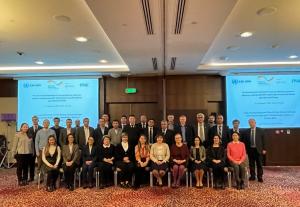
Joint efforts to harmonize data collection, strengthen monitoring and data exchange on water quality, develop early warning systems on water pollution at transboundary waters and improve collection and sharing of data on transboundary aquifers are needed for effective regional cooperation in Central Asia. These are the messages of the Regional Workshop on Monitoring, Assessment and Information Sharing in Transboundary Basins in Central Asia which took place on 1 and 2 February 2023 in Astana. The meeting was organized by the International Water Assessment Centre, the United Nations Economic Commission for Europe and the Green Central Asia Initiative implemented by the German International Cooperation (Deutsche Gesellschaft für Internationale Zusammenarbeit (GIZ) GmbH).
Experts from water, environment and hydrometeorology authorities from Kazakhstan, Kyrgyzstan, Tajikistan, Turkmenistan and Uzbekistan discussed progress and lessons learned in developing monitoring and data exchange in the region. Finland, Germany, the Netherlands, Slovakia, World Meteorological Organization, International Sava River Basin Commission, International Network of Basin Organizations, International Groundwater Resources Assessment Centre and the Water Convention Secretariat shared their experience and good practices.
Participants identified many good examples of cooperation on monitoring and data exchange between countries of Central Asia. These include the work of the Chu-Talas Water Management Commission (Kazakhstan-Kyrgyzstan), the development of cooperation between Kazakhstan and Uzbekistan on water quality in the Syrdarya basin, hydrological data exchange between hydrometeorological authorities of the Central Asian countries, and cooperation on joint assessment and modelling in the Pre-Tashkent Transboundary Aquifer shared by Kazakhstan and Uzbekistan. At the same time, the region still needs to improve legal and institutional frameworks and develop financial mechanisms to operationalize regular data exchange in transboundary basins. Harmonization of monitoring standards and techniques remains crucial for monitoring of water quality in transboundary rivers. Delineation, inventory, monitoring and sharing of data on transboundary aquifers in the region are important steps towards prevention of their pollution and over-exploitation.
The Updated Strategies for Monitoring and Assessment of Transboundary Rivers, Lakes and Groundwaters (2023) can assist governments and basin organizations in step-by-step efforts to set up joint monitoring. Developed under the Convention on the Protection and Use of Transboundary Watercourses and International Lakes (Water Convention), they provide strategic guidance, building on the global experience and technological developments in this area.
Joint monitoring and assessment of transboundary waters are among the key obligations under the Convention on the Protection and Use of Transboundary Watercourses and International Lakes (Water Convention). To facilitate implementation, a number of guidance documents have been developed on step-by-step approaches in establishing monitoring and assessment systems for transboundary waters. Through its programme of work, the Water Convention assists countries with strengthening transboundary water cooperation and integrated water resources management in line with the Target 6.5 of the 2030 Agenda for Sustainable Development.
The Green Central Asia Initiative is implemented by Deutsche Gesellschaft für Internationale Zusammenarbeit (GIZ) GmbH, the Potsdam Institute for Climate Impact Research (PIK), the Helmholtz Centre Potsdam - German Research Centre for Geosciences (GFZ), the Martin Luther University Halle Wittenberg and the German-Kazakh University (DKU). This Initiative promotes the German foreign policy on climate and security within the framework of the United Nations and supports the implementation of SDG 6 (clean water and sanitation), SDG 13 (climate action) and SDG 15 (life on land). The Initiative also contributes to the efforts under the new EU Strategy on Central Asia (June 2019) which provides a policy framework for EU engagement with the countries of Central Asia and focuses on promoting resilience, prosperity and regional cooperation.

